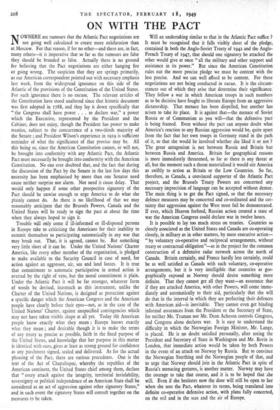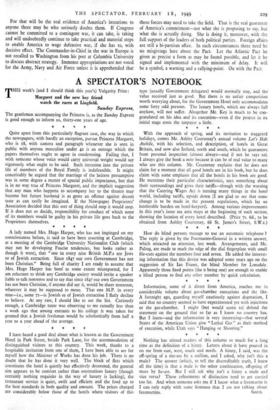ON WITH THE PACT
NOWHERE are rumours that the Atlantic Pact negotiations are not going well calculated to create more exhilaration than a Moscow. For that reason, if for no other—and there are, in fact, many others—it is imperative that so far as the rumours are false they should be branded as false. Actually there is no ground for believing that the Pact negotiations are either hanging fire or going wrong. The suspicion that they are springs primarily, as our American correspondent pointed out with necessary emphasis last week, from the widespread ignorance on this side of the Atlantic of the provisions of the Constitution of the United States. For such ignorance there is no excuse. The relevant articles of the Gonstitudon have stood unaltered since that historic document was first adopted in 1788, and they lay it down specifically that " the Congress shall have power . . . to declare war," a power which the Executive, represented by the President and the Cabinet, does not enjoy, though the President has power to make treaties,- subject to the concurrence of a two-thirds majority of the Senate ; and President Wilson's experience in 1919 is sufficient reminder of what the significance of that proviso may be. All this being so, since the American Constitution cannot, or will not, be brought into conformity with any Atlantic Pact, the Atlantic Pact must necessarily be brought into conformity with the American Constitution. No one ever doubted that, and the fact that during the discussion of the Pact by the Senate in the last few days this necessity has been emphasised by more than one Senator need cause neither surprise nor alarm. Nor need it cause delay. That would only happen if some other prospective signatory of the Pact should be unwise enough to urge America to do what she plainly cannot do. As there is no likelihood of that we may reasonably anticipate that the Brussels Powers, Canada and the United States will be ready to sign the pact at about the time when they always hoped to sign it.
Trouble will only come if ill-informed or ill-disposed persons in Europe take to criticising the Americans for their inability to commit themselves to participating automatically in any war that may break out. That, it is agreed, cannot be. But something very little short of it can be. Under the United Nations' Charter America, like every other member of the organisation, is pledged to make available to the Security Council in case of need, for action against an aggressor, air, sea and land forces. It is true that commitment to automatic participation in armed action is averted by the right of veto, but the moral commitment is plain. Under the Atlantic Pact it will be far stronger, whatever form of words be devised, inasmuch as this instrument, unlike the Charter of the United Nations, is designed as protection against a specific danger which the American Congress and the American people have clearly before their eyes—not, as in the case of the United Nations' Charter, against unspecified contingencies which may not have taken visible shape at all yet. Today the American people know exactly what they mean ; Europe knows exactly what they mean ; and desirable though it is to make the terms of any treaty as precise as possible, faith in the fixed purpose of the United States, and knowledge that her purpose in this matter is identical with ours, gives at least as strong ground for confidence as any parchment signed, sealed and delivered. As for the actual phrasing of the Pact, there are various precedents. One is the text of the Act of Chapultepec, whereby the republics of the American continent, the United States chief among them, declare that " every attack against the integrity, territorial inviolability, sovereignty or political independence of an American State shall be considered as an act of aggression against other signatory States," and in such event the signatory States will consult together on the measures to be taken. Will an undertaking similar to that in the Atlantic Pact suffice ? It must be recognised that it falls visibly short of the pledge, contained in both the Anglo-Soviet Treaty of 1942 and the Anglo- French Treaty of 1947, that should one signatory be attacked the other would give at once "all the military and other support and assistance in its power." But since the American Constitutian rules out the more precise pledge we must be content with the less precise. And we can well afford to be content. For these negotiations are not being conducted in vacuo. It is the circum- stances out of which they arise that determine their signific.ance. They follow a war in which American troops in such numbers- as to be decisive have fought to liberate Europe from an aggressive dictatorship. That menace has been dispelled, but another has arisen to take its place. It is against that—the menace of Soviet Russia or of Communism as you will—that the defensive pact is being framed. Even without the pact can anyone doubt what America's reaction to any Russian aggression would be, quite apart from the fact that her own troops in Germany stand in the path of it, so that she would be involved whether she liked it or not ? The great antagonism is not between Russia and Britain but between Russia and America. Britain for geographical reasons is mare immediately threatened, so far as there is any threat at all, but the moment such a threat materialised it would stir America as swiftly to action as Britain or the Low Countries. So far, therefore, as Canada, a convinced supporter of the Atlantic Pact project, and the Brussels Treaty Powers are concerned any necessary imprecision of language can be accepted without demur. The main thing is to get the Pact signed, so that the necessary defence measures may be concerted and co-ordinated and the cer- tainty that aggression against the West must fail be demonstrated. If ever, which Heaven forfend, Russian action created a state of war the American Congress could declare war in twelve hours.
It is possible to lay too much stress on treaties. Countries so closely associated as the United States and Canada are co-operating closely, in military as in other matters, by mere executive action- " by voluntary co-operative and reciprocal arrangements, without treaty or contractual obligation"—as in the project for the common construction of a defensive radar network across the north of Canada Britain certainly, and France hardly less certainly, could be as well satisfied as Canada with such voluntary, co-operative arrangements, but it is very intelligible that countries as geo- graphically exposed as Norway should desire something more definite. That they cannot get all they want—an assurance that if they are attacked America, with other Powers, will come imme- diately and automatically to their aid, particularly that she will do that in the interval 'in which they are perfecting their defences with American aid—is inevitable. They cannot even get binding informal assurances from the President or the Secretary- of State, for neither Mr. Truman nor Mr. Dean Acheson controls COngress, and Congress alone declares war. It is easy to understand the difficulty in which the Norwegian Foreign Minister, Mr. Lange, is placed. He is no doubt satisfied personally, after seeing the President and Secretary of State in Washington and Mr. Bevin in London, that immediate action would be taken by both Powers in the event of an attack on Norway by Russia. But to convince the Norwegian Storthing and the Norwegian people of that, and to urge that Norway should join in the Atlantic Pact in spite of Russia's menacing gestures, is another matter. Norway may have the courage to take that course, and it is to be hoped that she will. Even if she hesitates now the door will still be open to her when she sees the Pact, whatever its terms, being translated into definite co-operative defensive action, with plans fully concerted, on the soil and in the seas and the air of Europe. For that will be the real evidence of America's intentions to anyone there may be who seriously doubts them. If Congress cannot be committed to a contingent war, it can take, is taking and will undoubtedly continue to take practical and material steps to enable America to wage defensive war, if she has to, with decisive effect. The Commander-in-Chief.in the war in Europe is not recalled to Washington from his post at Columbia University to discuss abstract strategy. Immense appropriations are not voted for the Army, Navy and Air Force unless it is apprehended that those forces may need to take the field. That is the real guarantee of America's commitment—not what she is proposing to say, but what she is actually doing. She is doing it, moreover, with the full support of the leaders of both political parties. Foreign affairs are still a bi-partisan affair. In such circumstances there need be no misgivings here about the Pact. Let the Atlantic Pact be given as precise a form as may be found possible, and let it be signed and implemented with the minimum of delay. It will be a symbol, a warning and a rallying-point. On with the Pact.







































 Previous page
Previous page